Finite Transcendence
Finite Transcendence
Existential Exile and the Myth of Home
Steven A. Burr
LEXINGTON BOOKS
Lanham Boulder New York Toronto Plymouth, UK
Published by Lexington Books
A wholly owned subsidiary of Rowman & Littlefield
4501 Forbes Boulevard, Suite 200, Lanham, Maryland 20706
www.rowman.com
10 Thornbury Road, Plymouth PL6 7PP, United Kingdom
Copyright 2014 by Lexington Books
All rights reserved. No part of this book may be reproduced in any form or by any electronic or mechanical means, including information storage and retrieval systems, without written permission from the publisher, except by a reviewer who may quote passages in a review.
British Library Cataloguing in Publication Information Available
Library of Congress Cataloging-in-Publication Data
Burr, Steven A., 1975- author.
Finite transcendence : existential exile and the myth of home / by Steven A. Burr.
pages cm.
Includes bibliographical references and index.
ISBN 978-0-7391-8795-1 (cloth : alk. paper) -- ISBN 978-0-7391-8796-8 (electronic)
1. Existentialism in literature. 2. Exiles in literature. 3. Home in literature. 4. Exile (Punishment) in literature. I. Title.
PN56.E77B87 2014
809'.93384--dc23
2014011806
 TM The paper used in this publication meets the minimum requirements of American National Standard for Information Sciences Permanence of Paper for Printed Library Materials, ANSI/NISO Z39.48-1992.
TM The paper used in this publication meets the minimum requirements of American National Standard for Information Sciences Permanence of Paper for Printed Library Materials, ANSI/NISO Z39.48-1992.
Printed in the United States of America
Acknowledgments
The present work is the result of several years research and writing, and far more time engaging the mood and questions contained herein. Along the way, many professors, colleagues, and students have helped me to better understand, focus, and clarify my purpose and the direction this text would ultimately take. As I completed my doctoral studies at Georgetown University, no one person did more to inspire, encourage, and educate me than Francis J. Ambrosio, Associate Professor of Philosophy; all that is of value in this book is undoubtedly a credit to him for sparing so much of his time and wisdom for me. Likewise, Randall P. Donaldson, Associate Professor of German and Director of the Graduate Program in Liberal Studies at Loyola University Maryland, has been an influential force in my life and career for more than a decade, and I thank him for all that he has done for me, first as a teacher, then as a mentor, and then as a colleague, but always as a friend. Special thanks are also due to Phyllis OCallaghan, Terrence P. Reynolds, Frederick J. Ruf, John B. Brough, and Anne Ridder, all of Georgetown University, and Wolfgang W. Fuchs, of Towson University; each played a significant part in influencing and encouraging the person I had to be to write this book. Special thanks are due as well to Jana Hodges-Kluck, Associate Editor at Lexington Books, her assistant, Natalie Mandziuk, and Christine Fahey, Production Editor at Lexington Books; it has been a pleasure to work with them and everyone else at Lexington. Additionally, the suggestions offered by an anonymous reviewer were especially helpful, as were discussions with John Marmysz, College of Marin, regarding earlier versions of the work in progress. Finally, although I am profoundly indebted to each individual noted above and many others still, it is to my wonderful wife, Ruth, that my greatest debt is due: for her unfailing interest, support, encouragement, and inspiration; for her dedication that sometimes rivaled my own; and, most importantly, for helping me to see what home really means.
Excerpt from Little Gidding from Four Quartets by T. S. Eliot. Copyright 1942 by Houghton Mifflin Harcourt Publishing Company; Copyright renewed 1970 by T.S. Eliot. Reprinted by permission of Houghton Mifflin Harcourt Publishing Company. All Rights Reserved. International copyright permission granted by Faber & Faber, Ltd.
Excerpt from EXILE AND THE KINGDOM by Albert Camus and translated by Justin OBrien, copyright 1957, 1958 by Alfred A. Knopf, a division of Random House LLC. Excerpt from LYRICAL AND CRITICAL ESSAYS by Albert Camus and translated by Ellen Conroy Kennedy, translation copyright 1967 by Hamish Hamilton Ltd and Alfred A. Knopf, a division of Random House LLC.
Excerpt from THE FALL by Albert Camus and translated by Justin OBrien, translation copyright 1956 by Alfred A Knopf Inc. Excerpt from THE FIRST MAN by Albert Camus and translated by David Hapgood, translation copyright 1995 by Alfred A. Knopf, a division of Random House LLC.
Excerpt from THE MYTH OF SISYPHUS by Albert Camus and translated by Justin OBrien, translation copyright 1955 by Alfred A. Knopf, Inc., copyright renewed 1983 by Alfred A. Knopf, a division of Random House LLC.
Excerpt from THE PLAGUE by Albert Camus and translated by Stuart Gilbert, translation copyright 1948 by Stuart Gilbert, copyright renewed 1975 by Stuart Gilbert. Excerpt from THE REBEL by Albert Camus and translated by Anthony Bower, translation copyright 1956 by Alfred A. Knopf, a division of Random House LLC.
Excerpt from THE STRANGER by Albert Camus and translated by Stuart Gilbert, 1946 and renewed 1974 by Alfred A. Knopf, a division of Random House, Inc. Used by permission of Alfred A. Knopf, an imprint of the Knopf Doubleday Publishing Group, a division of Random House LLC. All rights reserved. Any third party use of this material, outside of this publication, is prohibited. Interested parties must apply directly to Random House LLC for permission.
Introduction
We shall not cease from exploration
And the end of all our exploring
Will be to arrive where we started
And know the place for the first time.
T.S. Eliot, Four Quartets
What remains for the individual in the world where there is no home? This question encapsulates a fundamental challenge of the ontological situation, as that challenge is constituted in the experience of exile and the longing for home. While the desire for Truth or meaning to ones existence may arise more explicitly as a definitive directing force of Being, the question of such meaning cannot be wholly resolved while the challenge of exile remains inadequately addressed; before questions of the meaning of human existence may be posed and answers subsequently attempted, the question of ones place in, and relation to, the world must first be faced.
In its most common, and perhaps most literal, manifestations, exile is experienced as the forced expulsion from ones home into a new place where one is a stranger, longing to find some ground upon which one can relate to the new abode if not return to the home that has been lost. Yet the home that is lost is much more than merely a place of habitation; existentially, home also entails not just the connection between oneself and ones place but also ones connection with the attendant features of life in a particular place at a particular time. Edward Said, in characterizing exile as fundamentally a discontinuous state of being, notes that exiles are cut off from their roots, their land, their past. This disconnection is, however, only the beginning; the exile experience, which arises most acutely in this sudden disconnection, is equally constituted in the hope for a possible future reconnection with ones home. The exile, therefore, is not merely one who has lost ones home but also one who maintains a devoted hope for its restoration.
To be compelled to leave ones home is perhaps the most traumatic and devastating experience one can undergo while still living. Yet despite the trauma, this particular kind of experience does not hold exclusive right to the name exile; the definitions and descriptions of the literal exile experience may equally apply to experiences which may not be so narrowly defined as the forced expulsion from ones home. Instead, exile may be experienced as an alienation from a Divine Order, from an inherent connection with others or with the world, or from the possibility of knowledge, understanding, and meaning. The exile experience is not limited to the immediate experience of physical movement but rather is manifest at every level of human existence, thus existential exile is proposed here as a name for the exile experience which is an ever-present component of human reality.
Next page
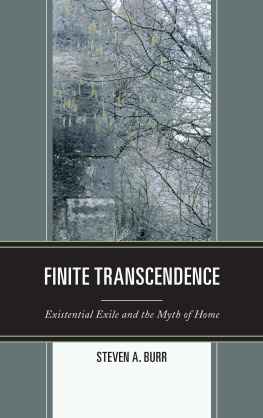




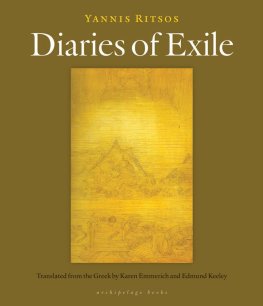
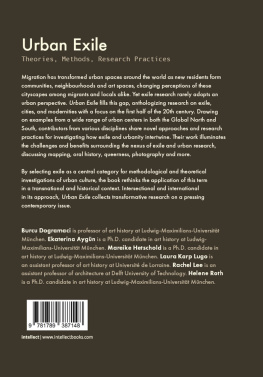
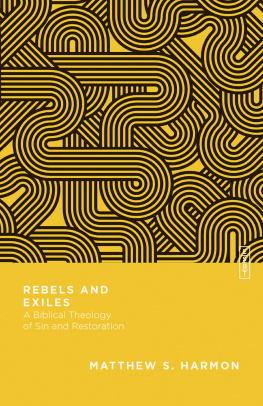

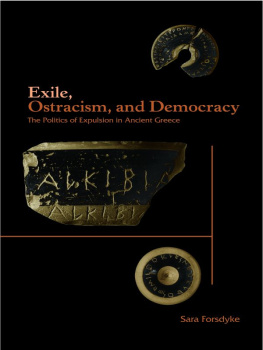
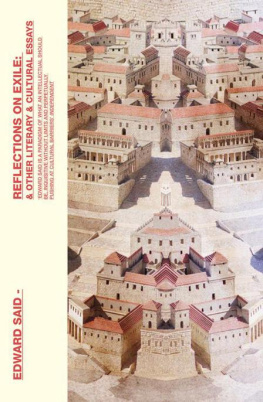
 TM The paper used in this publication meets the minimum requirements of American National Standard for Information Sciences Permanence of Paper for Printed Library Materials, ANSI/NISO Z39.48-1992.
TM The paper used in this publication meets the minimum requirements of American National Standard for Information Sciences Permanence of Paper for Printed Library Materials, ANSI/NISO Z39.48-1992.